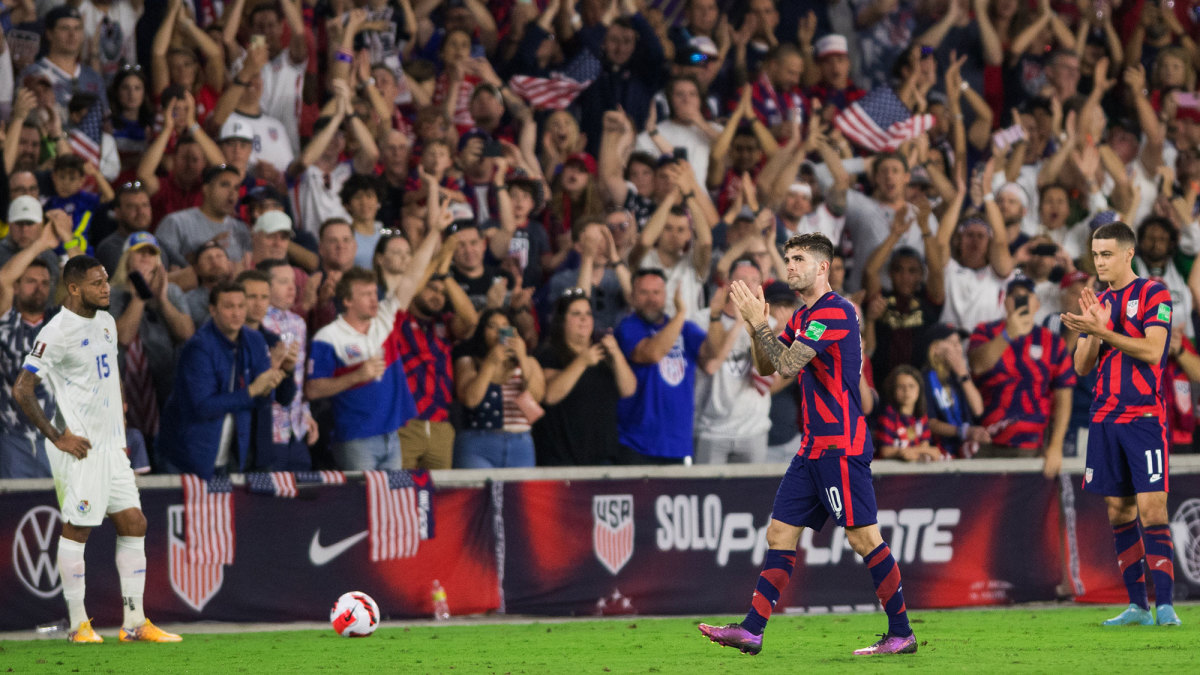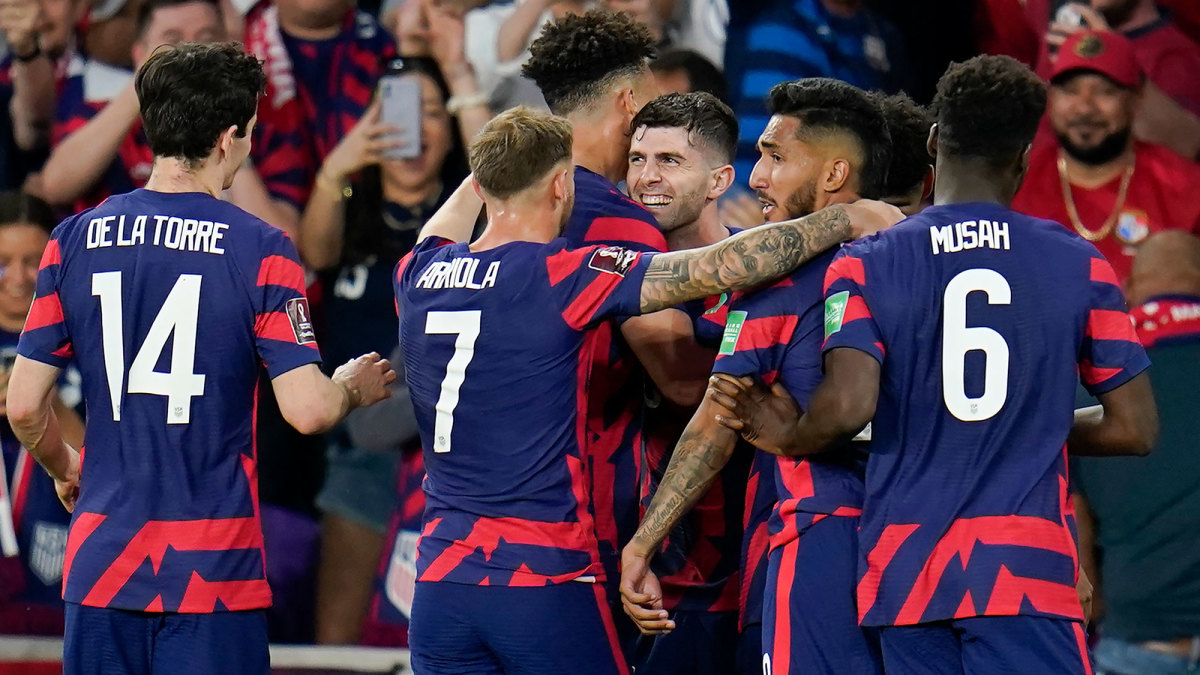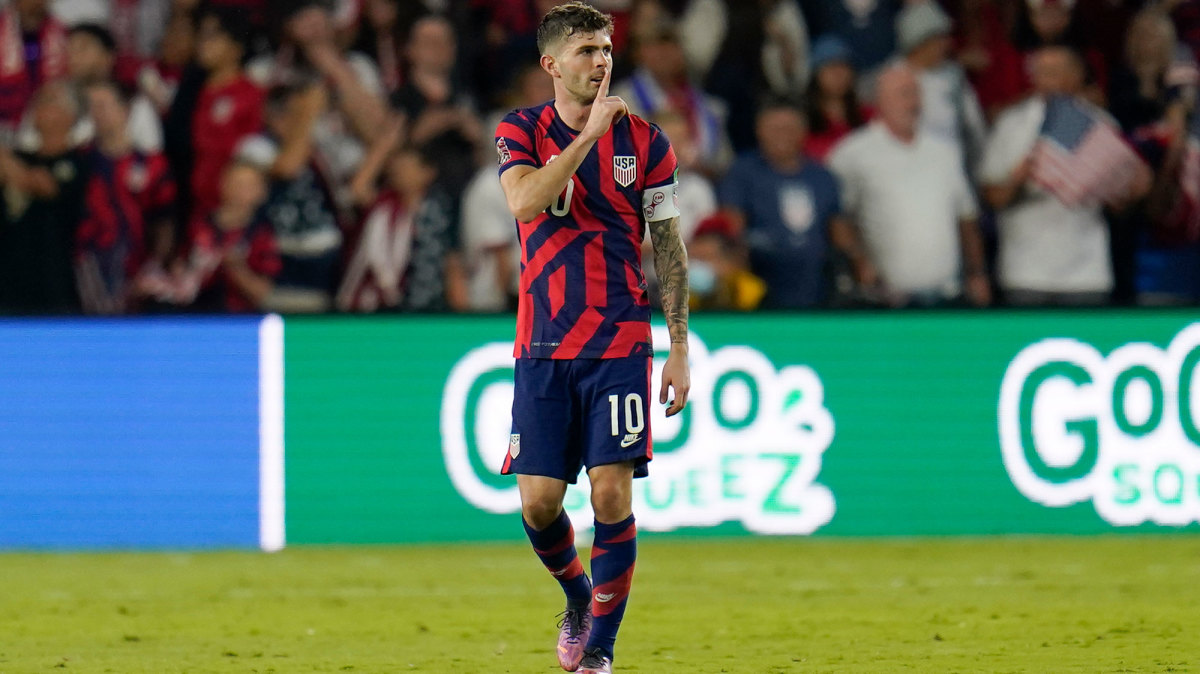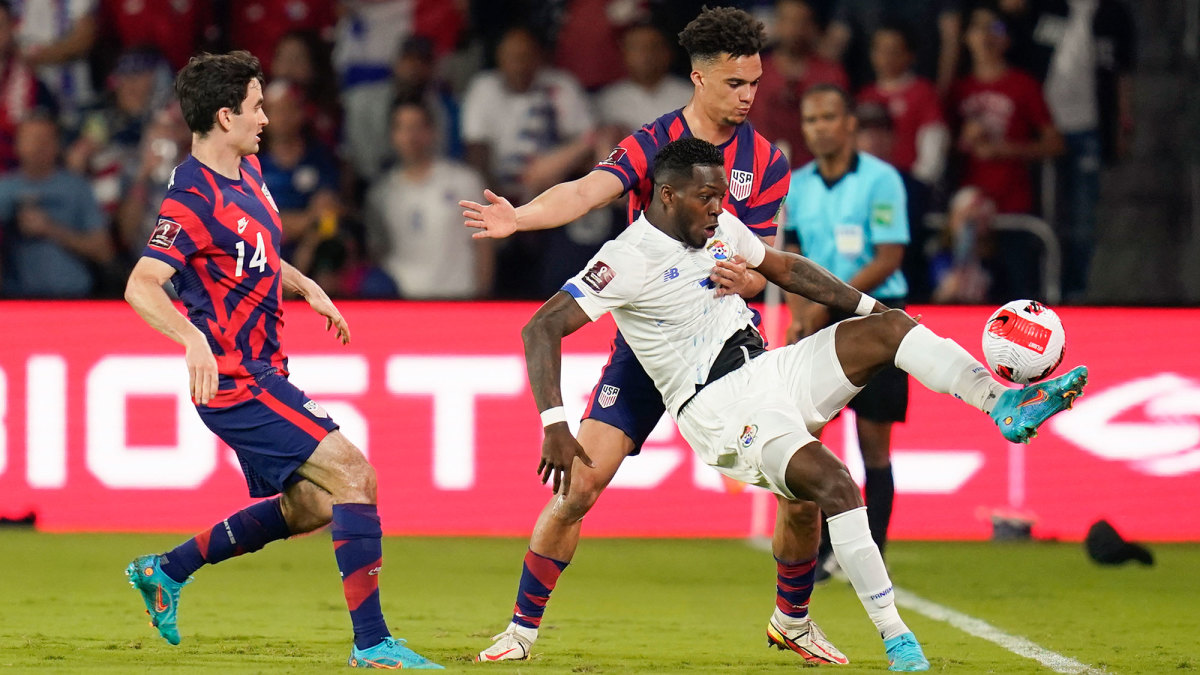USMNT Knows Better Than to Assume Its World Cup Qualifying Job Is Done
ORLANDO, Fla. — The American men were energized, the Orlando crowd was buzzing and any doubt about the result was erased within the first half hour. Christian Pulisic scored the opener and the U.S. was off and running, leading Panama by multiple goals at intermission before coasting to an easy and emphatic win in its penultimate World Cup qualifier.
Only an unthinkable, unprecedented result in the road finale would prevent the Americans from punching their ticket to the World Cup. The job appeared done.
As it was in 2017, so it is again, eerily, in 2022. Copy and paste. The similarities are glaring. But it didn’t feel like there was genuine symmetry on Sunday evening at sold-out Exploria Stadium. There, this new, ambitious and overhauled U.S. national team blasted Panama, 5–1, behind Pulisic’s hat trick, and stepped confidently to the threshold of the Qatar World Cup.

Everyone connected to coach Gregg Berhalter’s squad, and every fan watching, is well versed in the events of October 2017. The U.S. beat Panama by four goals in the very same venue at the same stage of qualifying, then traveled to Trinidad needing only a draw against a last-place Soca Warriors ‘B’ team. The trip felt like a formality. But what followed was the most stunning and traumatic failure in American soccer history—one that continues to reverberate and served as a catalyst for the national team’s ongoing youth movement.
That 2017 U.S. team was in transition, caught between generations and gutted of much of its cohesion and chemistry after years under former coach Jurgen Klinsmann. His replacement, Bruce Arena, appeared to be on the verge of dragging the U.S. to Russia before stumbling badly in the stretch run.
This new national team is on a much different trajectory. After three years of building under Berhalter, there’s and clear tactical foundation and an established core of young players who say frequently that they relish coming into camp and enjoy working with each other. Many appear regularly for top European clubs. They’ve learned on the fly in Concacaf, winning the Gold Cup and Nations League titles last summer before climbing to second in the Octagonal, which will send the top three finishers to the World Cup. This isn’t a flawed group lacking an identity and limping to the finish line.
They can finish that climb Wednesday in San José, Costa Rica. The U.S. (7-2-4) has never won there, but it doesn’t need to in the Octagonal finale. In fact, the visitors can lose by five goals to Los Ticos (6-3-4) and still qualify for the November-December World Cup. The last time the U.S. lost any match by six was a home friendly against France back in 1979. If the inconceivable does occur, the Americans will still head to a one-game playoff in June against either New Zealand or Solomon Islands. But that possibility seems so unlikely, both mathematically and athletically—even more than failing to draw in Trinidad four-plus years ago.

“I’m not celebrating anything,” said winger Paul Arriola, a member of that 2017 team who scored in the first half Sunday night. “I was in this exact position, or very similar position, four years ago, and we know how that qualification ended. So for me, it’s just maintaining focus, understanding that we still have work to do and anything is possible. The mentality of this group is, and has to be, to get a good result against Costa Rica.”
The nature of Sunday’s win and the euphoric mood at Exploria was enough to prompt someone on the sideline to hastily give the players a banner that read ‘QUALIFIED’ as they celebrated with fans behind the south goal. Considering this program’s history, it was a cringe-inducing error. Most of the American men didn’t seem aware of what they were carrying, but it was Pulisic who recognized what was happening and pulled the banner out of his teammates’ hands.
“The guys didn’t know at all what it said,” Pulisic explained. “Once we realized it, it was just, there’s no need to show that off because we still have a job to do and we know that. That’s why we moved it.”
Pulisic’s reaction was a poignant reminder of the Chelsea star’s value to the national team, and of his unwillingness to revel in any sort of victory before the task is truly done. His tears were the lasting image of that loss in Couva, where he was a bright spot on a dreary evening. On Sunday in Orlando, he helped the U.S. earn a shot at redemption with an energetic and effervescent performance. His night was highlighted by two first-half penalty kicks and a stunning goal in the 65th minute, when he touched the ball between his own legs, then through the legs of a Panamanian defender before finishing cooly past goalkeeper Luis Mejía.
“I think the important thing was he did his role, and his role involves making special plays and scoring some goals,” Berhalter said of Pulisic, who captained the side. “But there’s a whole other bunch of things that come with it, and that’s what you saw tonight.”
Berhalter had Pulisic’s history in mind when awarding the armband.
“The coaching staff talked about it and and decided on Christian, I think because of the journey,” the manager said. “You have a guy that’s been there before. He was on the field when we didn’t qualify, and this was us saying to him, ‘This is a new group. This is a new team, and you’re a leader and we want to show that.’”

Pulisic now has five Octagonal goals, which puts him level with Canada’s Jonathan David for second in the competition. Jesús Ferreira scored the other U.S. goal against Los Canaleros, who were playing for their World Cup future but were overwhelmed early and unable to break through until the 86th minute. The team that stifled a leggy, disjointed U.S. side down in Panama City last fall was nowhere to be found.
“We needed the three points bad to put us in a really good spot to qualify, and we’re really happy with the performance,” Pulisic said. “It feels great to get a hat trick, of course, my first one with the national team. But more importantly, just to help the team to win and put us in a good spot with one game left. Absolutely we can enjoy tonight, but the job’s not done yet. We have one more really important game and we’re taking it very seriously. We need to go in and get the job done.”
Not many coaches face the prospect of planning for a game they can lose by five. It’s an odd assignment for Berhalter and his staff. Some 20 members of the U.S. delegation caught a stomach bug in Mexico, the coach confirmed Sunday, and multiple players endured the altitude at the Estadio Azteca and then the must-win pressure of Sunday’s qualifier. While winger Tim Weah and defender DeAndre Yedlin will return from yellow-card suspension, others may be running on fumes. The strange nature of the task in San José will have to be balanced with the Americans’ ambition to earn their first win in a city that’s bedeviled them for years.
“I think the mentality of this group is completely different from the past, and I have full confidence in this team to be able to go down and get a result,” Arriola said.
“We’ll put a lineup on the field that is going to go for the win. I don’t think the guys would want any less. I know the coaching staff doesn’t want any less,” Berhalter said. “We want to put a team on the field that’s going to compete.”

Costa Rica, which is guaranteed an intercontinental playoff spot at minimum, has beaten the visiting U.S. badly before, most notably in the 4-0 pounding that cost Klinsmann his job in late 2016. The U.S. was a defeated team that day, appearing listless, uncertain and as if it didn’t want to be there. It’s tough to imagine the current group looking similar. The Americans obviously wanted to clinch on home soil. The banner was printed. But Costa Rica’s win in El Salvador earlier Sunday ended that possibility. Instead, the U.S. funneled the energy they might’ve used to celebrate qualification toward running it up on Panama. A fraction of that ruthlessness in San José will end the World Cup drought and send the U.S. to Qatar.
“We honestly approach it like any other game. We’re going to prepare exactly the same as we would if we needed a win. So we’re going to go to Costa Rica and not treat it like that at all. So we’re going to go there and we want to win,” Pulisic said.
“I just really want to play in a World Cup and so does this team, and that’s why tonight was so important to us. And I’m just really happy that we’re able to be in a good position to go do that and finish the job off.”
More Soccer Coverage:
